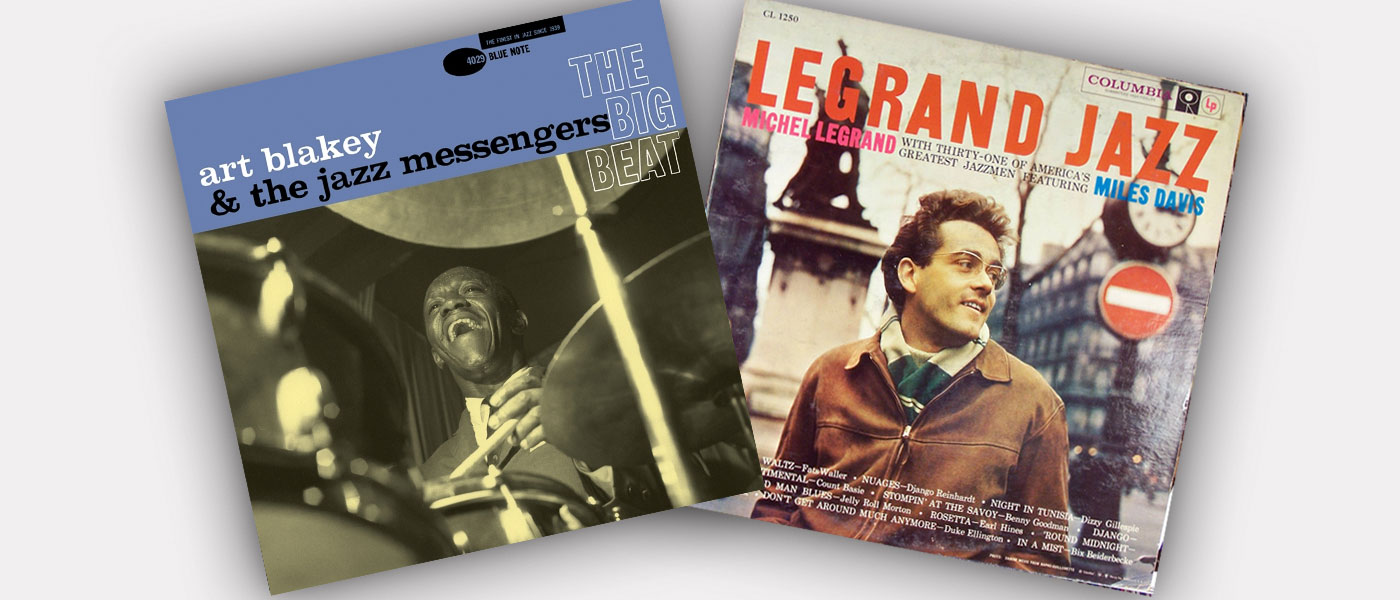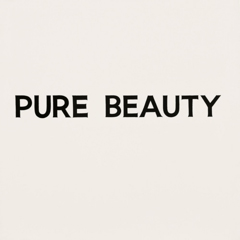
The first thing I noticed after unwrapping Pure Beauty by NYC rapper SHIRT was the hilarious details on the physical product. Third Man Records often etches quirky messages into the dead wax, and this one has the Nike logo in side A and Adidas in B. This seems to be in reference to a video SHIRT made involving the use of both logos without either company’s consent. Instead of the standard legal warnings on the jacket, you get “duplication of this record makes you a [expletive] legend, dog.” So, what do we have here? A developing “art is free” theme, maybe? Right away, we’re asking questions. Great start. SHIRT has plenty going on. He’s enrolled in a Masters program at a Swiss art school. He took his name from his hobby of designing… shirts, obviously. He’s Third Man’s first signed rapper, and he made his first big splash in 2014 by pranking one of his hometown papers – the New York Times.
Secrets Sponsor
The hijinks continue once you’ve dropped the needle on (in?) Pure Beauty. I initially thought I had a crap pressing, but the effect is deliberate. I probably wouldn’t have led with the scratchy, weathered record sound (on the stellar “Snowbeach,” no less), but SHIRT is likely unaware of how many magnificent Third Man recordings were ruined by shoddy United Record pressings before Third Man opened their own plant. I have PTSD about the whole thing. (I thought Third Man Pressing had botched their President’s latest album, but as it turns out, someone else did that for them.) My Muddy Waters record from TMP is pretty great, and it turns out Pure Beauty is too, so let’s hope this continues.
SHIRT’s music is certainly worthy of the major(ish) label signing. Amongst a million other sounds, it involves sinewy guitar lines, super bass grooves, and sparse bongo beats – all in the aforementioned “Snowbeach” leader. The vocal delivery is smooth as a baby’s ass throughout, and there aren’t too many featured artists to gum up the works. There are lyrical tributes to NYC, the fine arts, women (as a proposed aggregate Nobel Prize winner – instead of Bob Dylan), and weed (SHIRT prefers the Sour Diesel strain, which is apparently plentiful in Switzerland). He’s big into climate change, both literally and figuratively. And SHIRT pulls something off on Pure Beauty that the Rolling Stones couldn’t even do on Exile On Main Street: he uses my least favorite instrument (steel drums) in a song I actually like. He also uses some spoken word samples (actually just one long sample) in a song I really don’t. That’s on the album closer, “Mise En Abyme.” The monologue, perhaps not surprisingly, regards the creative process. So, there you go.
There are some extras in this set. They include, and are limited to, a lyric sheet (thankfully), a poster (of some text in a language I don’t understand, but I recognize the word “Shirt”), a hilarious insert (with instructions from John Baldessari, whose artwork is also on the printed inner sleeve, for a 1971 art installation that he was unable to attend), and… that’s it. No download code, which would have simplified the spreading of the Gospel. The vinyl sounds great, so get that. And keep an eye out for what comes next. In whatever medium SHIRT chooses.
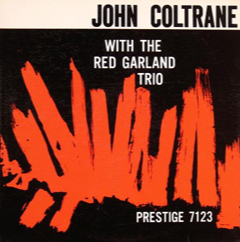
Excepting SHIRT’s release and the odd Record Store Day titles in April, things have been a little slow for new releases lately. At least as far as my interests are concerned. So, I’ve taken the downtime to circle back for some older titles that are (mostly) still readily available. Exhibit A: John Coltrane with the Red Garland Trio by Analogue Productions as part of their Prestige reissues campaign. Let’s start there…
As one might imagine, the music is superb. We can dispense with that bit of mystery right now. The Garland Trio kicks things off sans Coltrane for the first part of “Traneing In.” (Get it?) Immediately, the listener can feel that this is going to be a special event. You’re in the room with the band as you feel the hammers of Garland’s piano striking its strings. You hear the individual notes decay as they meld with the ones coming next. The small band configuration really lets the majesty of this reissue shine from the gate, and you’ll make mental notes to explore the availability of other Garland Trio titles. When the Trane finally pulls into the station, the tension of our expectations has been building for what seems like forever. It’s like when Orson Welles finally steps out of that shadowy Viennese doorway about an hour into The Third Man: dapper as hell, and ready for mischief. Coltrane lays out during a Paul Chambers bass solo before Garland jumps back in the ring over the top rope, then Coltrane slides back in under the bottom. “Slow Dance” reveals the players’ softer side and sensitivity to the moment. It also reveals some ticks in the pressing. (To my ears, Quality Record Pressings has improved. They can absolutely compete with what Pallas has become, but they’re still not on top of the pressing pile. RTI is.)
The effects of Kevin Gray’s mastering are predictably sublime. The recording is lifelike and detailed, as the grit of Chambers’s bow against the strings is in sharp relief during “Bass Blues.” Garland’s notes thump against your eardrums as if your head were under the hood. The entire production is presented in deep, three-dimensional mono, allowing you to drift away in your own meditations – as if I imagine the players did during the recording sessions. (Oddly, this makes for a near perfect follow-up listen to the SHIRT record. Maybe I’m nuts, but they sound akin to me.)
This was a welcome find, if not exactly a “discovery.” We knew what these players were capable of, after all. And it points us in a direction for future explorations until someone releases something new worth hearing. Perhaps we’ll circle back for some still available (though dwindling) Music Matters Jazz titles. Or maybe we’ll dig deeper into AP’s Prestige reissues. We’ve previously reviewed their take on Tommy Flanagan’s Overseas, and that was a downright revelation. We have a lot to anticipate if the Prestige records are on par with what we’ve heard so far. Diehard Coltrane vinyl lovers have this already, and it’s a fine point of entry for the curious or uninitiated. It’s like going to church…
(This record was purchased at MusicDirect.com.)
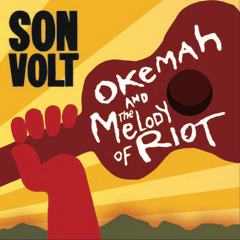
A buddy gave me a copy of Son Volt’s Okemah and the Melody of Riot on a CD-R just prior to its 2005 release. It seemed like a return to form for the band after a seven-year layoff. Digital was the only option at the time, but the album finally saw a double (red) vinyl unveiling as a Record Store Day “First Release” in 2018. That means additional copies are forthcoming. I just can’t figure out when because the band’s website seems to still be stuck in 2005. “Keep an eye out” is the best I can offer the reader right now. It’ll pay off, I promise.
Right off the bat, the Minutemen-inspired start/stop dynamic that Son Volt/Uncle Tupelo made such great use of is on full display. It was the early band’s ace in the hole, as the soft/loud thing was for the Pixies. “Bandages and Scars” leans on the effect for its catchiest hook, and is one of the most fully realized songs on the album. Many of my favorite Okemah tunes seem more like sketches than full-blown compositions. “Atmosphere” and “Gramophone,” especially. There’s no fat on those bones, and Andrew Duplantis’s harmony vocals shine on both. The latter ditty is a heartfelt ode to the magic of vinyl (hurray!), while “Six String Belief” celebrates liberation through Rock ’n Roll, in general. “Medication” reveals some of the Indian vibes that bandleader Jay Farrar explored in his solo material leading up to Okemah, while “Endless War” calls on the darkness that helped differentiate Farrar’s material from that of his jauntier Uncle Tupelo bandmate and nemesis. (We need not speak his name here. The truth is out there.) Those are some highlights.
There is also a side and a half of bonus material included with this set, comprised mostly of stripped down live versions from radio station appearances. The extras are cool enough, but are mostly just quieter versions of the studio takes with Farrar maybe strumming an acoustic in place of his more typical vintage electrics. They’re not essential. The main benefit of their being here is that you can hear those Duplantis harmonies more clearly than ever. (Seriously, that guy sings like an angel.)
These recordings seem to lack a bit of depth that would put this work in a higher weight division. I suspect they were digitally recorded in the first place. The release was mastered for vinyl, and is certainly warmer than the CD I was given 13 years ago. We are far from putting icing on a pile of manure and calling it a cake territory here. I am happy to have the records on my shelf. The pressings are pretty good. Okemah is a no brainer for dyed in the wool Son Volt fans, but I will always recommend the band’s debut masterpiece, Trace, as an intro to the band’s music. From there, I’d go with the expanded vinyl version of The Search (sometimes referred to as On Chant and Strum) before getting into this one. Those three make for a nice trio of honest latter day Rock ’n Roll goodness. They almost seem chivalrous. Just what we need in such challenging sonic times.
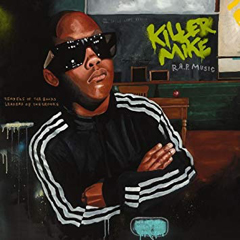
Oh, baby. I have such great friends. A buddy of mine came to visit from back home a couple of months ago, and he came bearing gifts. I was graciously presented with a copy of Killer Mike’s R.A.P. Music from 2012. It’s fascinating. And complex. Much of it involves straight gangster rhymes, so it’s surprising that the album is somehow affiliated with… the Cartoon Network. Adult Swim, specifically. I know that Mike has given voice to their characters in the past, but I’m missing the connection to R.A.P. Music, specifically. My friend is in the broadcast company’s employ. They had this masterpiece trapped in a closet. Thank God. Because this version is, out of print and expensive. But you can still easily acquire the repress. You should probably get on that. Like, now.
There are so many lyrical allusions to Rappers of Gangster past in here: Amerikkka’s Most Wanted, Snoop, Pac, and Run DMC – just to get started. There are also bevies of disparate references to a variety of historical figures: Donald Goines, Coretta Scott King, Jacqueline Kennedy Onassis, and Iceberg Slim (as Robert Beck). Mike cut his teeth with Outkast, so you often have to refer to the printed lyrics just to keep up, and that’s a rewarding read almost every time. One thing becomes quite clear right away – Killer Mike ain’t down with the American political system, generally, and the Office of the President, specifically. And he’s an equal opportunity eviscerator as he mows down the Bushes (ha!), Bill Clinton (Hilary might not have been on his radar in 2012… but she probably was), and Obama. Those are the ones he goes after only within the span of a song called “Reagan.” As one might guess, he saves his most acidic bits for the 40 th POTUS, but he sees them all as puppets. In the same song, he laments the state of rap music due to its pervasive glamorization of some of the very things that are seemingly romanticized in other R.A.P. Music compositions. There’s no easy way out of this one. This stuff is tricky and thick.
Secrets Sponsor
Just as the Coltrane/Garland record points us in an exploratory direction, R.A.P. Music insists that you seek out works by Killer Mike’s collaborators. There’s some impressive scratching during “Go!” by the appropriately (and hilariously) named DJ Abilities. El-P guests on “Butane,” and produced the entire record, which gives it a much more cohesive sonic narrative than what is usually available on today’s rap market. Mike and El-P would go on to form Run the Jewels on the strength of this collusion, and, Lord knows, we’re all better off for that having happened. El-P is a Bad Man. The production didn’t exactly result in the most 3D of sound staging, but it’s wide and wildly interesting. It’s bass-y with lots of synths and old-timey drum machine beats under the layers. Also, if you’re turned off by the lyrical content, you can still get down with the included disc of crazed instrumentals. (These are not on the repress, but they are available online for $10.)
This pressing is good, not stellar. It’s on “electric marbled lime” vinyl. The artwork is stellar (with a matted texture excepting the glossy green graffiti) and sad and hilarious (“ no yo child left behind”). The more I listen, the more I love. I stumbled onto two all-time fave hip-hop records this month during exceedingly lean times. Ain’t that living’?
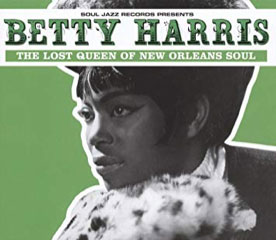
I had some extra store credit at the local retailer after a recent vinyl purge, so I used it to pick up some Record Store Day titles that I’d left on the shelf and The Lost Queen of New Orleans Soul, a compilation of songs by Betty Harris. (She is not to be confused with Irma Thomas, the Queen of New Orleans Soul who was never hard to find.) This, friends, is a veritable funhouse of sound.
Especially on the loaded first side. We could go through a song-by-song shakedown, but the vibe is consistent throughout, and none of these songs were hits outside of New Orleans anyway. Most of them are pretty great, although side two lags in a couple of spots. Not to worry, there are three more that do not. At all. As always, I’d prefer my Funk uncut, certainly by string sections. The horns work just fine. This is New Orleans, after all. Neither the strings nor the brass sections dominate. That’s a job for Harris’s voice. Which is powerful. A little Atlantic era Dusty (hear “Lonely Hearts”) with some Aretha sprinkles when things get super sticky. Harris’s pipes are ultimately original. The church that she escaped from sneaks back in through the vestry throughout her secular sermon, if that’s even possible. (I’m unsure. I’m a heathen.) This isn’t quite a second line stomp, but there’s grit aplenty, and the songs seem familiar to anyone who’s spent any amount of time steeping in the Soul Music kettle. Harris had a couple of minor national hits that she’d recorded in New York prior to the sessions that spawned these tracks, but those are not represented here. I think we’ll be alright without them.
We can thank Soul Jazz Records for this set and a host of other relentlessly cool compilations, even if there’s nothing especially singular about their mastering or pressings. For the record (ahem), both are just fine. Their content is almost always superb. I have some more of their New Orleans sets, a double shot of Delta Swamp Rock (their nomenclature, not the author’s), a Gospel Soul joint, and a Jackie Mittoo feature. They’re all great. Their liners are always extensive and informative, although I’d really like to know which songs involve the Meters as the backing band on the Harris set. Alas, the individual songs’ personnel is not itemized for us nerds and junkies. Harris’s story is described though, and there are lots of interesting bits. Her dad was a live booking agent who worked with Sister Rosetta, the Blind Boys of Alabama (and Mississippi, for that matter), the Dixie Hummingbirds, and Sam Cooke. Harris is pictured with Stevie Wonder and Muhammad Ali, likely from her time as a performer at the Apollo, on the inner sleeves. She was mentored by Big Maybelle over the course of a two-week tour after approaching the performing and requesting instruction. She didn’t get along with Allen Toussaint who wrote most of her songs, and produced everyone on this set. I’ve spent more time on the gossip than the music, but you should not. This one was released in 2016, so I’d advise you jump while you can. Soul Jazz sets get pricey after getting scarce. Comes with a download code. All aboard!!


